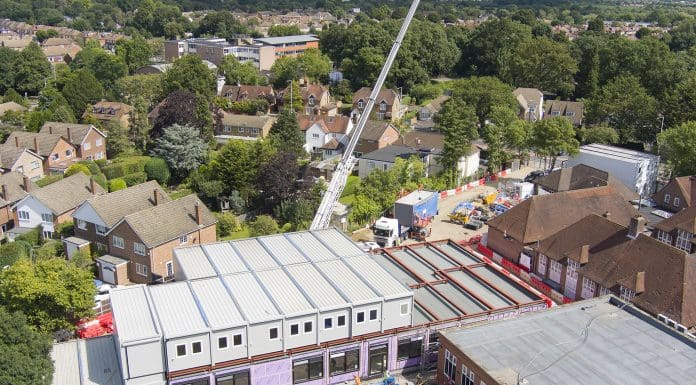You could be forgiven for thinking that offsite construction projects have seen little success following negative headlines, but as Jackie Maginnis, chief executive of the Modular & Portable Building Association (MPBA) knows only too well, there are some phenomenal stories waiting to be told
It was with great interest that I read an article featured on the NBS website by David Bain, research manager at NBS, and Allan Wilen, economics director at Glenigan. The picture the research paints is far removed from the negative headlines and is more reflective of what our members are telling us.
According to Glenigan, there has been a gradual rise in the proportion of projects utilising Modern Methods of Construction (MMC) approaches. The 2023 NBS Digital Construction Survey published last November found that 57% of respondents had been part of an offsite construction project.
Reflecting the growth in adoption of offsite evident in the Glenigan data, this is an increase from 50% in the previous 2021 survey. For consultants such as architects and engineers, the figure was 58% and it was 63% for contractors.
MMC is a broad category, and our interest obviously lies within the volumetric modular sector. And guess what – good news. NBS research findings concluded that modular construction was utilised on projects by 34% of survey respondents. These include projects like apartment blocks or schools that consist of substructures manufactured as modules.
Encouraging signs for offsite construction project growth
In addition, economic, regulatory and environmental performance issues are set to encourage further growth in the use of offsite construction over the medium term. The shortages of skilled labour are likely to intensify as the construction industry emerges from the current market downturn.
The Building Safety Act is also set to change how projects are delivered, requiring more detailed preconstruction design and limiting the scope for onsite design changes. This plays to the strengths of volumetric modular technology and is predicted to increase the opportunities within the sector.
Clients and designers now need to improve their buildings’ environmental performance are similarly likely to favour the greater use of factory manufactured systems.
Digitally constructed and virtually tested
Volumetric modular buildings are less susceptible to poorly specified products as time can be taken upfront to validate the correct specification of materials.
Designs are digitally constructed and virtually tested before they move on to the manufacturing phase. This process eliminates waste and achieves highly accurate and airtight building envelopes designed and built to higher sustainability standards.
This allows clients to have confidence in the quality and performance that they can expect from their new building.
Unlike factory manufactured buildings, there is significant evidence that traditional construction methods do not produce structures that perform as well as design expectations and there is a void between anticipated and actual in-use performance.
PMV a driving force in specification
While the focus is on how offsite can help solve the housing crisis, as many of our members are aware, volumetric modular construction has made the greatest inroads in other sectors.
Pre-Manufactured Value (PMV) is another driving force in the specification of volumetric technology in public projects – particularly in the healthcare and education sectors.
PMV is a core metric for measuring the level of MMC in a project and is central to the UK government’s procurement programmes.
To secure a contract, suppliers are required to show that pre-manufacturing will account for at least 70% of their construction cost, which again plays to the strength of a volumetric modular approach.
The MMC sector for category one (volumetric) and category two (panelised systems) is an interesting place to be. The levels of investment and innovation are astounding and, as with any transformative technology, there will be hurdles to overcome.
Our industry, unlike others, has nothing to fear from the legislation surrounding the Building Safety Act and the road to achieve net zero targets in commercial buildings is a well-mapped route.
The MPBA and our members firmly believe that the benefits of manufactured buildings begin in the factory, continue to the construction site and last through the lifetime of the building.
As I scroll through the industry news section on the MPBA website, there are so many success stories, groundbreaking innovations and forward-thinking collaborations – so head over to www.mpba.biz/posts for a more positive perspective.
Jackie Maginnis
Chief executive
Modular & Portable Building Association
Tel: +44 (0)2475 90 1938
The post Industry statistics showcase successful offsite construction projects appeared first on Planning, Building & Construction Today.


